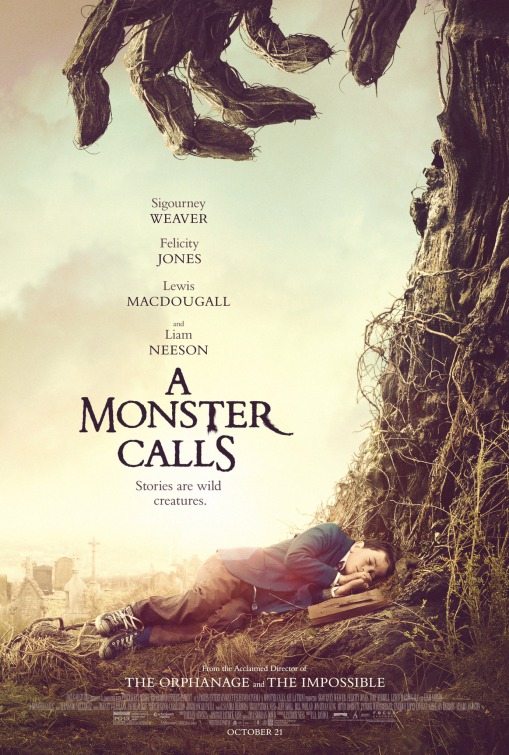Stories Are Wild Creatures
Director
J.A. Bayona
Starring
Lewis MacDougall
Liam Neeson
Conor O’Malley [MacDougall] is a young British teenager enduring an exceptional amount of stress. He is unable to sleep properly thanks to a reoccurring nightmare; the nightmare itself stems from the fear of losing his mother, Lizzie [Jones], who is terminally ill with cancer. School life isn’t much better as he finds it difficult to focus and in between lessons is bullied mercilessly. Other than his mother, home life offers little comfort as his father lives in America and his grandmother is incredibly strict and emotionally distant. It’s at this time that a Monster formed from the old yew tree on the hill comes to life, claiming he was summoned by Conor. In order to assist, the Monster offers to tell three stories in exchange for a fourth from the boy himself. As his mother’s condition worsens, Conor becomes more frustrated with the Monster’s rambling anecdotes that seemingly go nowhere.
As A Monster Calls draws to a close the first dawning realisation is how draining an experience it is. So many films pack an emotional punch but this feature refuses to hold back, bluntly and brazenly stating that children have to learn about death some time. As the film progressed I started to feel it was a cross between Pan’s Labyrinth and The Iron Giant but it lacks their optimism and subtle beauty, instead focusing on harsh reality with a glimmer of hope. With so many dire ‘family’ releases relying on fart jokes, bright visuals and really cliché morals, A Monster Calls feels more like an honest conversation with a pre-teen. Rather than shelter them from the truth of the world with positivity and upbeat denial, this story portrays a very frank look at life – something some children unfortunately learn the hard way. It does this with analogous tales which, in Conor’s young, black-and-white mind fail to make conventional sense. Rather than chortling this off with “you’ll understand when you grow up” the Monster character very openly explains that “humans are complicated beasts” and there isn’t always a good guy or a bad guy, most people fall somewhere in between. This type of honesty was also recently on display in Pixar’s Inside Out which really beautifully informed young children that sometimes it’s ok to be sad. A Monster Calls has a similar purpose to it but one much more focused, dealing with a far deeper dilemma: how does one explain to a child that your mother will die and when she does you will carry on?
All of this would have been a moot point if it weren’t for two major factors: the acting and the visual effects. Covering the portrayal side of things first, we need to really invest in Conor and nothing would kill that bond faster than an overly precocious child or a painfully unlikeable individual. Interestingly, MacDougall is a really hard character to get on with as he isn’t an obvious hero. Neither a boy nor a man, Conor goes through waves of selfishness, stubbornness, arrogance, cowardice and immaturity none of which are admirable or enviable qualities but they are all distinctly relatable, especially when trying to deal with something as crushing as a loved one’s terminal illness. Rising above the usual kid-actor deliveries, MacDougall goes through some rather unpleasant events with little reprieve and by enduring so much, you can’t help but feel bad for him. All too often the phrase coming of age is slapped on to a story but here it is truly earned as we witness a boy railing against things he cannot control to a young man ready to accept the world as a hard place to live in, thanks to the dark formula of old, classic folktales. It would have also been very easy to mar the experience with supporting roles that were caricatures but everyone present seems to be presented as if through Conor’s eyes. His mother is largely flawless and says all the right things, dealing with her own situation with extreme grace and acceptance. Sigourney Weaver as Conor’s grandmother is clearly a strict and orderly matriarch but openly admits to Conor that although they are an odd fit, they both have his mother in common, which serves as a classic rehash of that ‘you don’t get to choose your family’ adage. The same could be said for Conor’s father who appears briefly, played by Toby Kebbell, who acts as both a potential lifeboat but ultimately a bit of a disappointment – even though he’s never played with malice or disregard for his own son or his plight. Finally we have Liam Neeson’s voice work, bringing the Monster to life – while also adding to the familial unit for eagle-eyed viewers. It would have been quite easy to cast someone with a gentle elderly voice but there’s so much – for lack of a better phrase – apathetic truth in Neeson’s performance that he appears not to care how Conor feels, confronting him with very painful and cryptic life lessons without sugar-coating any of what’s to come.
Secondly, we have the visual elements. Admittedly, this is a gross simplification of a lot of components. Without a decent visual effects budget the Monster would look ridiculous and anything he said or did would be called into question. Thankfully, the Groot/Ent hybrid feels original and real enough to chime an emotional and credible chord. Then we have the Monster’s three stories (well.. two actually) which are presented in a unique and different art style (similar to the effects used in Hellboy II: The Golden Army, Night Watch and Harry Potter & The Deathly Hallows: Part 1), combining marionette-style figures and ink flushed backgrounds, which I believe mirror those used in the source material. By doing this the production saves a lot of money but also manages to create a vibrant and wonderful tonal look for these separate parables. Finally we have the cinematography, which brings England to life in a very real way with constant grey clouds, rain slicked roads and dark-cornered small houses. Something that was achieved thanks to the return of long-time collaborator Oscar Faura, who also worked as director of photography on The Orphanage and The Impossible.
Ultimately this is a really hard film to judge. A lot of releases aimed for adults will have depressing stories that, while they don’t end on a positive note, aren’t completely dower in their outlook. But when marketed and produced for a younger audience, suddenly the question is raised of whether it’s appropriate. I think for an impulse viewing, this would absolutely devastate a lot of people but with an open mind and knowing how grim it might get, I think it would be a very solid release for a lot of families. Furthermore, anyone who says films like this shouldn’t be made (and you’d be surprised how many outraged parents talk like that), how many releases are out there for a younger audience which tackles the harsh realities of death with a combination of honesty and fantasy? Sure, Harry Potter harps on about his dead parents all the time but at no point do we as an audience have to sit through a solid hour and a half of watching them die slowly. As entertainment, this is a difficult film to approach, as a therapeutic exercise in solidarity, it’s delightful.
Release Date:
1st January 2017
The Scene To Look Out For:
Highlighting one of the animated segments would be far too easy, as they stand out from Conor’s largely drab existence and serve as a break from the wall-to-wall bullying, misery and sorrow. Instead I liked the brief scene wherein Conor catches his grandmother watching copies of home-movies from several years prior, detailing how Lizzie raised her son with art and the creation of monsters. To me, it felt like a nice bonding moment that is largely absent from the rest of the film, as we only see Lizzie in a perpetually weakened state. Furthermore, it implies that the Monster visiting the young boy in his dreams could be strongly connected to stories stemming from his childhood, meaning one could interpret the film’s denouement as something truly fantastical or simply the power of subconscious suggestion.
Notable Characters:
James Melville has the unenviable task of playing Conor’s bully but does so brilliantly as he’s an utterly loathsome bastard. Like all bullies we know there’s probably something going on in his home life or internally that generates these unpleasant outbursts but they’re written and executed with such callousness that you can’t help but hate the shit. As with the other characters, he is only seen from Conor’s perspective so we never really understand what is going on. One could infer from the way certain encounters are shot and the manner in which lines are delivered that he’s dealing with issues of sexuality but as there’s no clarity, we can’t be certain. But the film once again falls back on honesty and states that even if you have the cathartic lashing out that all victims fantasise about, it rarely ends up the positive experience one would assume or hope for.
Highlighted Quote:
“What is a dream, Conor O’Malley? Who is to say everything else isn’t a dream?”
In A Few Words:
“An incredibly powerful and emotional slog that deals with a delicate subject with maturity and respect for its intended audience”
Total Score: 4/5
![The Red Right Hand Movie Reviews [Matthew Stogdon]](https://reviews.theredrighthand.co.uk/wp-content/uploads/2021/12/cropped-header1.png)




